
Isaac Julien’s “Lessons of the Hour” and the Many Visions of Frederick Douglass
Hired out to the brutal Edward Covey, a young Frederick Douglass worked to exhaustion during the week and spent Sundays “in a sort of beast-like stupor, between sleep and wake, under some large tree,” alternating between flashes of “energetic freedom” and “mourning,” he wrote in his Narrative. Beyond the woods, ...
Read More
Read More
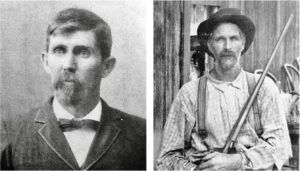
From Gray to Blue: An Odyssey of Deserting the Confederate Army and Joining the U.S. Army
Though radical at first, the U.S. Army’s recruitment of Confederate prisoners of war and deserters was not unreasonable by the winter of 1863-1864. “Thousands of Union soldiers were nearing the end of their three-year voluntary enlistment and draft calls were causing riots in Northern cities.”[1] Combined with prolonged indecision from ...
Read More
Read More
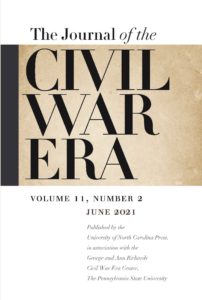
JCWE Editors’ Note, June 2021 issue
This issue, like many since the journal’s inception, reflects the chronological and thematic breadth of the field of the Civil War Era. It includes three original research articles, the Tom Watson Brown Award essay, a review essay, and the usual complement of incisive book reviews. The Tom Watson Book Award ...
Read More
Read More
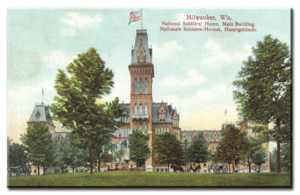
“A Grand Thing”: The Rebirth of Milwaukee’s Soldiers’ Home
When the U. S. government lived up to Abraham Lincoln’s second inaugural promise to “care for him who shall have borne the battle,” it chose Milwaukee as one of the sites for the three original branches of the National Asylum (later Home) for Disabled Volunteer Soldiers (NHDVS). The first men ...
Read More
Read More

Congratulations to the Winner of The Journal of the Civil War Era’s George and Ann Richards Prize!
Catherine A. Jones has won the $1,000 George and Ann Richards Prize for the best article published in The Journal of the Civil War Era in 2020. The article, “The Trials of Mary Booth and the Post-Civil War Incarceration of African American Children,” appeared in the September 2020 issue. Drawn ...
Read More
Read More
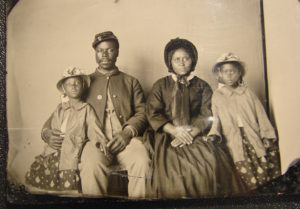
We’ve Always Been Here: Rediscovering African American Families in the U.S. Census
When I initially began examining United States Colored Troops (USCT) soldiers, I primarily focused on Civil War pension records. As previously noted, these rich primary sources can illuminate the forgotten lives of African Americans in many ways but do not (nor does any single historical record) tell the whole story ...
Read More
Read More
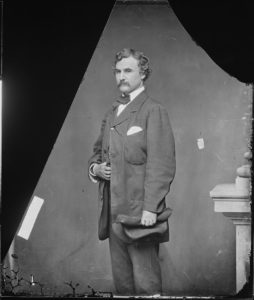
UVA Unionists: A Digital Project Studying University of Virginia Alumni Who Stayed Loyal to the Union
Note: “UVA Unionists” is one of two digital projects at the John L. Nau III Center for Civil War History that shed light on the area’s untold Unionist stories. The other project, “Black Virginians in Blue” [link to Will Kurtz’s Muster blog post], launched in April. See Will Kurtz’s recent Muster ...
Read More
Read More

Disney and Battlefields: A Tale of Two Continents
In the United States, significant portions of land have been set aside for battlefield parks to commemorate the actions of past generations and interpreted these spaces with regard to how they have shaped the present. In turn, as Edward Linenthal has argued, they became sacred ground.[1] As a result, some ...
Read More
Read More
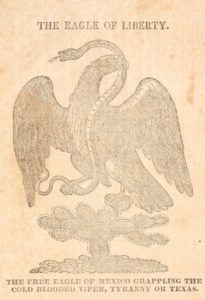
Texas Secession: Whose Tradition?
The Texan secessionists are at it again. In a bill submitted to the Texas State Legislature on January 26, 2021, state representatives have sparked, in legal form, the question of Texas secession once more. According to the author, Rep. Kyle Biedermann of Fredericksburg, TX, House Bill 1359 offers Texans “of ...
Read More
Read More
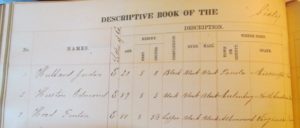
Black Virginians in Blue: A Digital Project Studying Black Union Soldiers and Sailors from Albemarle County, Virginia
For the last four years, the John L. Nau III Center for Civil War History at the University of Virginia has been working to uncover the untold story of Albemarle County, Virginia’s Black men who served in the United States Colored Troops (USCT) or Union navy. Our project, which we ...
Read More
Read More
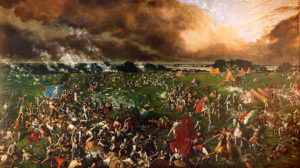
Insurrections, Indigenous Power, & The Empire for Slavery in the Southwest
The realities of Indigenous power, marronage, and Mexico’s emancipation policies haunted Anglo-American visions of a white supremacist imperial order in the trans-Mississippi West. On May 25, 1836 Congressman John Quincy Adams rose from his desk in the U.S. House of Representatives to excoriate Anglo-Texans’ “war of aggression, of conquest, and ...
Read More
Read More
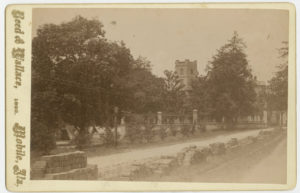
Teaching the Layered Histories of the Mount Vernon Barracks
During its 180-odd years of operation, Mount Vernon Barracks in south Alabama was home to thousands of people, including white soldiers, Apache prisoners, and Black psychiatric patients. It was an arsenal, a Confederate base, a U.S. Army outpost, a detention site for yellow fever victims, and a psychiatric facility. Shuttered ...
Read More
Read More
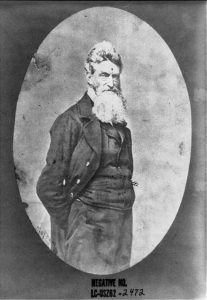
Insurrections Old and New: Teaching Perspective on the Events of January 6, 2021
On January 6, 2021 a mob stormed the American Capital in Washington, D.C. to overturn Donald J. Trump’s defeat in the 2020 election. Rioters pushed their way inside the Capital, vandalized the building and threatened to harm government officials, including the Vice President. In total, five people died. In the ...
Read More
Read More
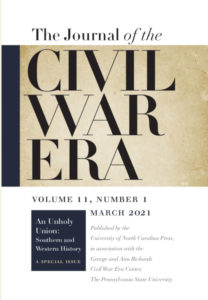
Editors’ Note for March 2021 JCWE
It is fitting that James Brooks will introduce this special issue and its contents, since this and the parallel volume in the Western Historical Quarterly represent his hands-on editing and his wide-ranging view of intertwined histories. We thank him, WHQ editor Anne Hyde, former JCWE editor Judith Giesberg, and former ...
Read More
Read More
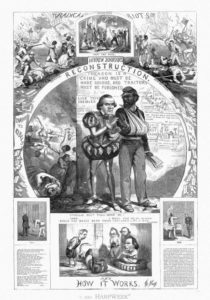
The Necessity of National Unity: Defeated Confederates’ International Appeals to Unity
Citizens were divided. Violence threatened the stability of the nation. After the violence ended, calls rose for unity. This pattern played out recently with calls to move past and forgive insurrectionists in the name of national unity following the January 6, 2021 attack on the US Capitol. Such a pattern ...
Read More
Read More
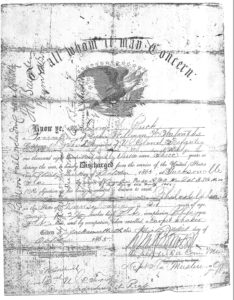
Black Families’ Unending Fight for Equality: Teaching Civil War Pension Records
When teaching the history of the United States Colored Troops (USCT), students often ask how we can find historical records from these historically marginalized people? Since many of the soldiers were working poor and formerly enslaved, they did not have (for various reasons) the time, resources, or (in some cases) ...
Read More
Read More